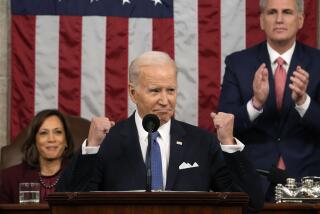With Islamic militants at his back, Rouhani avoids meeting Obama
- Share via
Folks at the White House may have been just a bit too giddy about the prospect of a sudden thaw in relations with Iran. They angled for a face-to-face meeting between President Obama and the new Iranian president, Hassan Rouhani, since both leaders were in New York City for the opening of the United Nations General Assembly this week.
But it was not to be.
Apparently the American side made the offer of a personal “encounter” between Obama and Rouhani. They were eager to follow up on the positive statements the Iranian president had made in recent days suggesting the confrontation over Iran’s nuclear weapons program could be ended amicably. But the Iranian officials said even a quick handshake would be “too complicated” right now.
“The Iranians have an internal dynamic that they have to manage,” a senior administration official said to Los Angeles Times reporters. “And the relationship with the United States is clearly quite different than the relationship that Iran has with other Western countries, even.”
That “internal dynamic” is the reality that, though Rouhani is the popularly elected president, ultimate power rests in the hands of supreme leader Ayatollah Ali Khamanei. Khamanei has endorsed an opening to the United States, but he can easily apply the brakes if the process starts moving in a direction he dislikes. Additionally, the paramilitary Revolutionary Guard, defenders of the Islamic Revolution, are a powerful force with a vested interest in an antagonistic relationship with the U.S. and Europe. They are not fans of Rouhani.
In other words, Rouhani is walking out on a tightrope over a pool of sharks.
The Iranian president appears ready to deal with Obama, give up the nuclear weapons program and bring an end to economic sanctions against his country. In his speech at the U.N., Rouhani said Iranians and Americans “can arrive at a framework to manage our differences.” Nevertheless, he was still quite critical of American policies, alluding to “warmongering pressure groups” who still push for tough action against Iran and condemning the use of drones and American reliance on “the military option.”
In his own U.N. speech Monday, Obama offered Iran an olive branch. Rouhani did not reject that peace offering, but neither did he take hold of it with unbridled enthusiasm. Rather, he sort of sniffed at the leaves, all the while peering over his shoulder to see who, back home, might be sharpening their knives.
More to Read
A cure for the common opinion
Get thought-provoking perspectives with our weekly newsletter.
You may occasionally receive promotional content from the Los Angeles Times.











